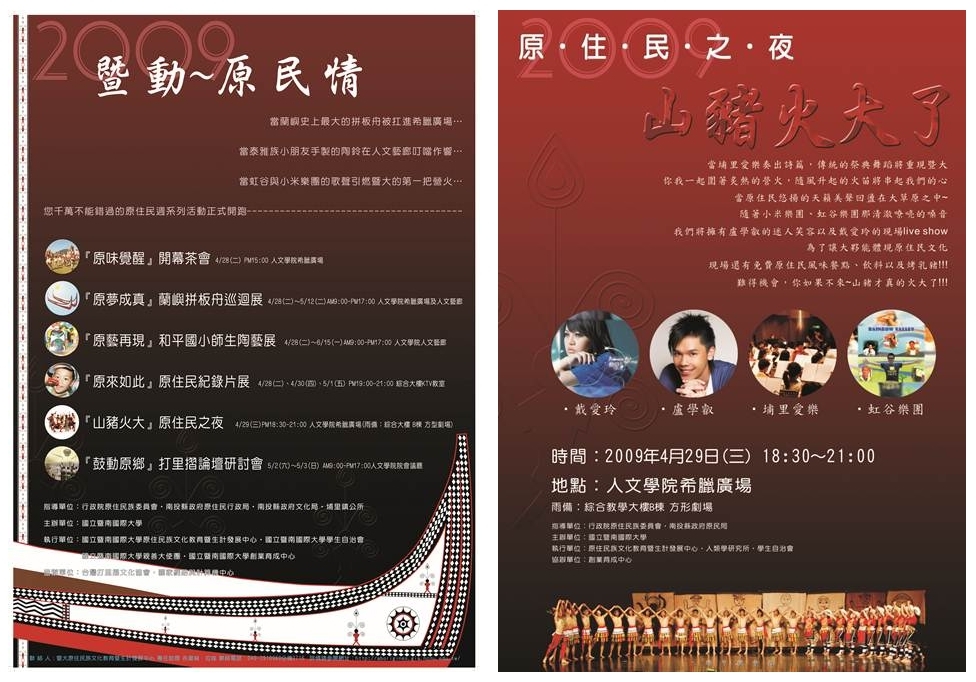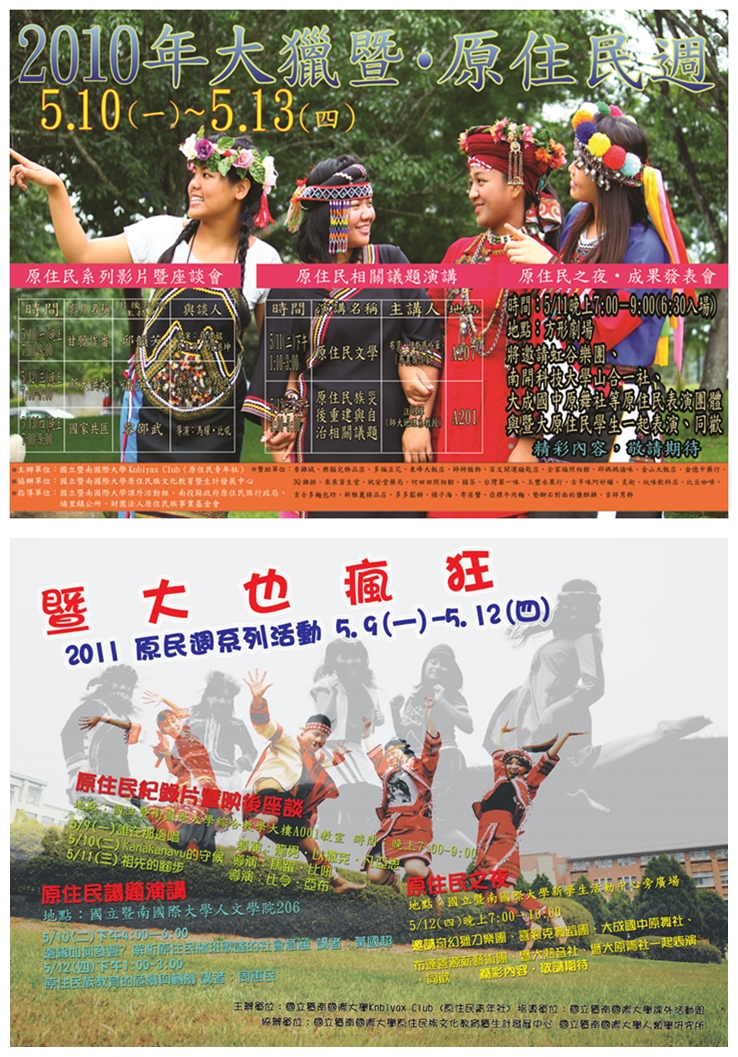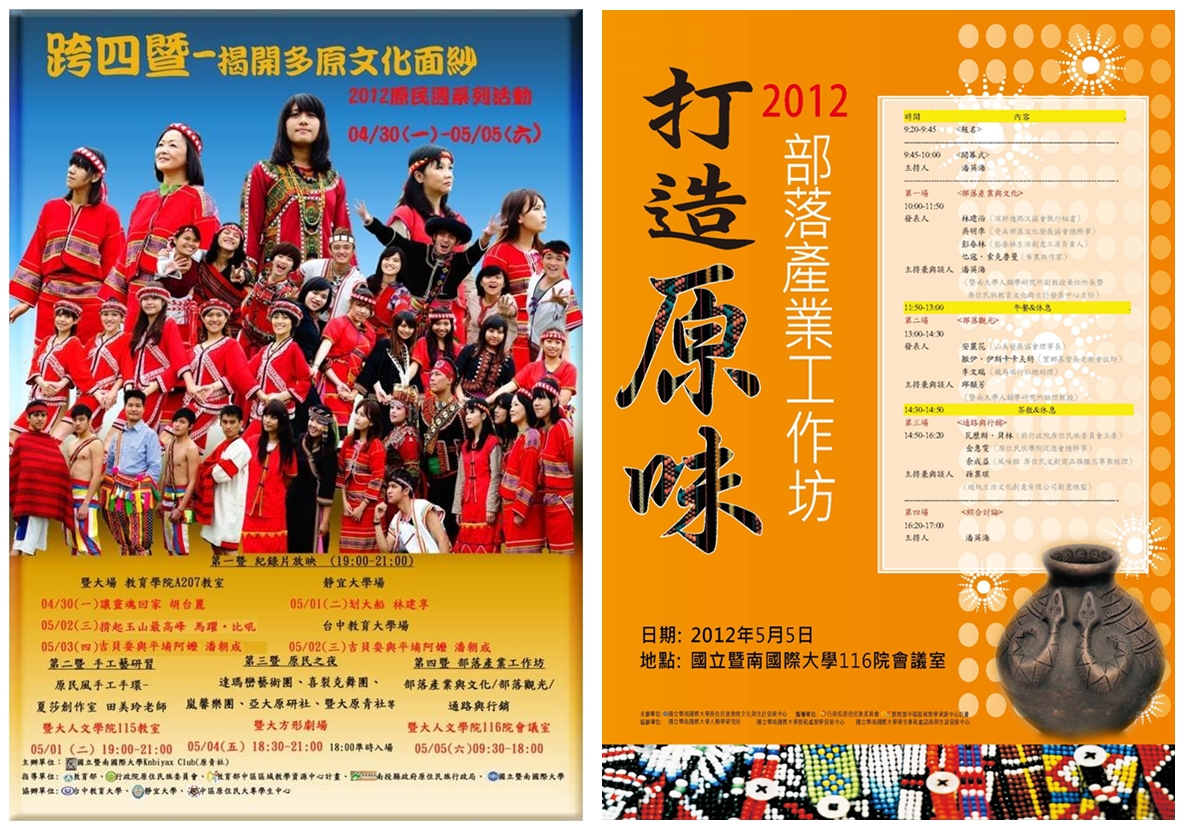人類學、原住民與我的三角戀習題
序曲:初戀
要釐清這段糾葛的三角戀習題,必須將時間倒轉到1990那年,我決定放棄台大數學所學業,轉考人類學研究所的關鍵時刻。那是我人生中最不順遂的考試,連著兩年落榜只能苦苦地單戀人類學,卻意外地促成了和原住民部落的美麗相遇。
在準備人類所考試時,我從文獻中第一次清楚知道台灣有「原住民」的存在,之後便睜大眼睛注意相關資訊,正好碰到明立國老師舉辦的「第一屆原住民樂舞系列:阿美篇」徵求義工,透過這個管道,我認識了一群來自花蓮奇美部落的阿美族人。他們遠離家鄉在北部作建築工或開聯結車,一大家子人落腳在我的家鄉基隆北五堵的百福社區。和這一家阿美族人成為朋友後半年多的時間,我常常在星期六到他們的住處幫小朋友補習數學,結束後就留下來加入家族的聚會閒聊。補習其實是藉口,和他們歡聚在一起才是真正的目的。對於之前二十幾年人生非常狹隘地侷限在「北部都會地區/中產階級家庭/標準乖學生」世界的我來說,那些由歌聲、酒、和阿美式笑語交織而成的聚會像是一個奇幻世界,散發出新奇難以抗拒的氣息和魅力,讓我深深耽溺在其中,因此儘管知道父親會擔心地在窗台上等待我回家,還是常常流連到午夜時分才依依不捨地離開。
第二年夏天,我跟著這一家阿美族朋友一同回奇美參加豐年祭。奇美是一個非常傳統的阿美族部落,豐年祭之前要先舉行好幾天的捕魚祭,而女生是嚴禁參與的。我一個人坐在大橋上,像觀賞電影一樣看著祭典在秀姑巒溪畔進行,然後事情的發展也有如電影情節,一個扛著攝影機的男子過來和我搭訕,問我有沒有意願加入他們的工作室,參與自然科學博物館委託的九族簡介片拍攝計畫,就這樣我在1991年進入了多面向藝術工作室,參與九族簡介以及原住民紀錄片的拍攝。

圖片來源:奇美部落Facebook
那兩年多走訪許多部落的日子是我人生中非常重要的一個轉折,它開啟了一扇窗讓我得以從非常不一樣的視野重新認識、瞭解台灣這塊土地的多樣和豐饒。但那也是一段充滿困惑和矛盾的時光,欣喜的同時常覺得孤單:這些部落明明就在台灣,卻和我之前理解的台灣彷彿處在不同的時空;而即使我現在認識了他們,但在部落經歷的那些讓我心靈震撼如夢似幻的一切,卻幾乎完全沒有辦法和周遭的家人及朋友分享(這樣的情形即使到了二十年後的今天依然沒有太大的改變)。
從人類學研究生變身為大學老師之後....
1994年我考上台大人類學研究所,暫時告別了在部落間穿梭、工作的日子,直到1996年開始碩士論文田野後,才又重新接觸部落。在碩士和博士論文的田野期間,我不再像過去工作時在許多部落亂跑,而是依照人類學傳統的田野模式,選擇一個部落常住,和當地人一起生活。在這段時間裡,我與人類學和原住民的關係是很單純的齊頭並進,直到2004年來到暨南大學人類學研究所教書後,這個三角習題開始變得複雜了。
到了暨大後我的第一個田野地是仁愛鄉賽德克族的春陽部落。這裡原本是Tkdaya群(亦稱霧社群)的聚落之一,霧社事件後日本人將劫後餘生的族人強制遷往川中島,把原住在平靜、平和部落的部份Toda人(霧社事件時的味方番)移住到此。最初我提的國科會計畫與霧社事件有關,卻發現當地Toda人對此的反應不是很冷漠就是很負面,也從來不會去參與霧社事件相關的紀念活動,以致原本想要以霧社事件為主軸進行與歷史記憶有關的研究難以如願進行。除了選擇的主題觸礁外,當時我在研究上遭遇的另一個更大的瓶頸是對自己身份轉換的無法調適。還是研究生時,族人把我當成來部落學習的孩子,關心的總是我怎麼這麼久還沒畢業、結婚了怎麼不趕快生小孩;如今當我帶著大學老師的頭銜來到一個新的田野,清楚感受到不同於從前的一些目光,當中混雜著質疑、詰問和期待:「又是一個想來拿資料換論文的學者?」「你能給部落什麼樣的回饋?」「你是大學教授喔,所以你應該可以……」我並不認為這一連串的問號沒有道理,因為我的確也一直這樣問自己:「身為一個研究者、大學老師,我到底能為部落做什麼?」然而太過於執著這些問題卻又無解決之道,讓這些壓力形成了一個沈重的枷鎖把自己逼得幾乎窒息,甚至有好一陣子根本無法走進田野地。
最後我幾乎是完全放棄研究這件事,就只是去部落閒晃閒聊,卻意外地在每次住在我乾爸家臨睡前的喝茶閒談中,深深被他提及打獵時眼中閃亮的光芒所打動,寫出〈狩獵、山林與部落「產業」:走進一對賽德克父子的生命史〉這個完全不是當初預期之中的作品。這篇文章完成後投稿到台大考古人類學刊,審稿人的回應是不夠人類學,不夠學術,沒有與過去的泰雅研究有足夠的對話,希望能作大幅的修改。我清楚它從所謂學術的眼光來審視有很多不足,但是這篇文章對我而言有很重要的意義,是我和春陽乾爸爸一家人情誼的紀念,我不想把它改變成符合標準學術框架但卻是文中主角們無法親近的形式,於是主動撤回改投到《民俗曲藝》發表。
走向大眾: 暨大原民中心的成立
2007年暨南大學成立了「原住民族文化教育暨生計發展中心」,由人類所的潘英海所長接下中心主任的職位,因為所上只有我一人的研究領域是臺灣原住民,因而義務地協助中心的業務與計畫。一開始只是責任使然無從推託,卻沒料到因此開啟了我和原住民世界另一個不同面向的接觸。
參與原民中心的工作後,我才發現雖然從外在的條件看來,當代原住民在台灣的地位相較於十幾年前我工作跑原住民部落時有很大的改善,如在憲法上正名為「原住民」、有專屬的行政院原住民族委員會、在強調多元文化教育的口號下原住民母語和文化有了一席之地.....但實際上主流社會對於原住民的瞭解還是非常少,刻板印象仍舊嚴重,許多原住民學生依然無法坦然自信地面對自己的族群身份。就以暨大來說,雖然校址所在的埔里緊鄰信義與仁愛兩個原住民鄉,但校園內幾乎看不到任何原住民相關的議題,也沒有原住民社團,校方對原住民學生連在資訊上的掌握都非常不足(中心必須自行去各系所搜尋、統整原住民學生的資料),更別提有什麼特別的輔導或照顧。為了突破這些困境,2009年我和潘老師商量後,決定由中心舉辦盛大的暨大原住民週,包含展覽、紀錄片、論壇以及晚會一系列的活動,邀請在地文史工作者、原住民表演團體和部落國小參與,一方面希望在暨大校園裡打響原住民議題,另一方面企盼能透過這樣的活動激發起原住民學生的族群意識,而後主動作些事情。

我們的努力有了最直接真誠的回報,參與原民週的幾個原住民學生在活動結束後熱情澎湃的慶功宴上,毅然決定成立Knbiyax Club (暨大原青社),並邀請我擔任他們的社團指導老師。自第二年起主辦原民週的責任轉交給原青社,到今年已經連續辦了四屆,成為暨南大學一個很特別的傳統。暨大是個辦活動非常不容易的學校,儘管非常努力作宣傳,除了我們自己身邊的朋友、同學外,來參加的人總是非常有限。但即使如此,每年籌畫、舉辦原民週對我和原青社的意義非常重大,它是我們大家向心力和情感凝聚的場域,也是很重要的培力過程。

每年原民週最基本的架構是三場原住民紀錄片暨導演映後座談,加上一場盛大的晚會。前者的內容主要由我負責規劃再交由原青社執行,後者則完全是原青社統籌負責(我只堅持一定要邀請一個原住民樂團來嗨翻全場)。因為很清楚我一定會一直在他們身旁適時協助並作最堅強的後盾,這些孩子們越來越有自信和能量,每年下學期一開始就啟動原民週的籌備,從拍宣傳海報、邀請函、設計活動內容,一直忙到最後一天的晚會上台表演,所有大小事一起協力完成。對一個成員最多時也不過十個人的小社團來說,這是個很繁重的負荷,他們卻越來越投入且樂在其中,因為這活動已經成為原青社最閃亮的招牌和驕傲。

還記得原青社成立之初,無論是平常的社課或原民週活動,學生們的重心絕大部分放在歌舞的練習上,我雖然心中不盡然贊同但並未阻止,只是提醒他們除了歌舞之外原住民文化還有很多精彩的內涵,然後透過每年原民週活動插入一些當代的社會文化議題(例如今年辦的「部落產業工作坊」),或帶他們參與我覺得有意思的原住民藝文活動(如浩浩蕩蕩一群人南下去觀賞「很久沒有敬我了你」的戶外演出)。這幾年下來我和原青社之間發展出很好的互動與相互學習,這些孩子們越來越有有意願去接觸、關心更多的原住民文化面向與議題,而他們每年原民週晚會上的歌舞表演也成了我最期待的驚喜,因為其中總能看到傳統、現代以及他們創意的結合。今年晚會上我被他們清唱的鄒族傳統歌謠組曲感動到上台致詞時激動的語無倫次,之後還請他們帶我練習其中的三首,一起攜手在人類所期末晚會上作開場的小表演。

遇見大專山地服務團
在執行原民中心的相關計畫時,我意外地在部落國小遇見了以為早已不存在的「大專山地服務團」,並在初步的參與觀察之後,決定以北醫山服和師大山服為對象開始相關研究(參閱芭樂文 我也是小骨頭: 當人類學家進入大專山地工作隊)。山服在臺灣的人類學與原住民研究傳統中似乎都不是一個值得研究的深刻議題,我後來以此撰寫論文和提出國科會研究計畫時也的確碰到了相當的瓶頸與困難,以致在兩年後決定停止這個領域的研究,但我從未後悔自己當初的選擇和投注的心力。在臺灣作原住民研究是一件孤獨的事,近年來臺灣人類學界從事這個領域的越來越少,大部分學者和研究生都轉往國外或大陸發展,而部落是有著不同滋味的生活世界,沒有親身體驗過的人實在難以理解,因此真的很難和沒有去過部落的人聊部落,聊你的研究,儘管部落明明就在臺灣島上而非遙遠的異國。
因為認識山服,讓我頓時多了一群可以聊部落的朋友,這對我來說是非常重要且快樂的事。我發覺一些相當投入的山服團員和人類學家有一個相似之處,就是常處於接近精神分裂、不斷反省的情境,主要的原因在於跨文化的體驗所造成的中介狀態(liminality),它帶來混亂也帶來啟發。接觸這個領域後我也才知道,有不少曾經參加山服的人,因學生時代這個特殊的經歷因此對原住民部落有了牽絆,日後有的走入人類學,有的從事社會運動,有的作與原住民兒童托育或部落健康有關的事,透過山服,我突然開展了一些新的社會網絡,這是我之前作「傳統」人類學原住民研究時很少有機會碰觸到的一些領域和人脈。反觀人類學常以擁有全貌觀(holism)自居,但若是缺少實踐,以及和其他領域學科的交流,那所謂的「全貌」恐怕也只是自我學科定義下的全貌。當人類學者挾帶著過多理論與既有典範的束縛進入部落時,那或許是另一種形式的環境泡泡,讓我們可以隱身其中覺得安全。
虛擬和真實世界交錯的部落行走
在研究大專山服團的過程中,我因為想要與大學生們有多一些交流而使用了Facebook,又出乎預料地開展出一片新的天地。Facebook非常適合我這種對於個人隱私不是很在意又非常樂於和人分享心情和感想的個性,它讓我能夠得到許多在一般大眾媒體上難以獲得的原住民相關訊息,認識更多關心這些議題的朋友。Facebook對我而言不是虛擬的世界,而是真實世界的輔助與延伸。我和在部落認識的朋友、畢業的學生在Facebook上分享原住民議題,有時也會因此相約一起去參加相關活動;我在Facebook上認識的新朋友,有時會突然出現在真實世界中和我相認,其中一位這學期特地從中興來暨大修我「台灣南島語族研究」的課;我常常把自己去部落或參加原住民活動的照片、感想放在Facebook上和識與不識的朋友分享,從一些回應中瞭解大家初步的看法,有時引來不同意見或質疑,我也會視情況作解釋或回應。雖然作為一個溝通的介面,Facebook的確如許多人所質疑,不容易完整表達想法以致常有可能發生誤會或曲解的情形,但是當我使用Facebook的方式是針對各項原住民議題,持續、長期而且很誠摯地在這個介面上發文表達自己的看法,就會同樣遇見一樣和我用這個心態使用Facebook關心原住民議題的同好,這時展開的對話與交流就能有相當不錯的效果。
因著參與原民中心事務以及舉辦原民週等,我意外地在中部的原住民圈子有了小小的名氣(其實很大一個原因是這一帶作原住民研究的人類學家實在很少)。校內其他單位或老師有和原住民相關的事務時,常會找上我幫忙或合作(扮演這種中介的角色往往比我自己直接參與部落事務還要難為);校外一些有關原住民或多元文化的演講陸續上門邀約;我也和埔里在地的NGO團體「台灣原住民族學院促進會」有密切互動,應他們邀請擔任原民會重點(活力)部落計畫的評鑑委員或陪伴顧問,並在兩年前成為原促會的理事。
上述這些與原住民議題相關的事務,基本上只要時間不和學校的工作衝突,評估之後認為是“有意義”(如能讓大眾對原住民有較正向的基本認知)或 “有意思”的(如可以藉此走訪不認識的部落,或深入瞭解一些正在部落發生的現象等),我多半都會接下。這些邀約加上我主動透過Facebook或其他管道參與一些原住民相關活動,讓我近幾年來跑了不少部落,感覺上好像又回到二十年前在多面向藝術工作室時在全省跑透透的時光。

當我踏入越多的原住民部落、接觸到越來越多不同的人後,我亦發體認到自己對原住民和部落認識的不足,人類學對原住民的認識若仍只是強調定點、深入的田野,卻無法掌握當代台灣原住民社會更全面性的現象和脈動,那樣的知識其實非常狹隘,甚至可能只在學術領域裡才是有呼吸的。此外,人類學家研究了台灣原住民這麼長的時間,但不管是部落族人或其他來到部落的其他行動者,絕大部分對於人類學還是非常陌生,究竟「人類學為原住民作了什麼?」,「人類學能為原住民作些什麼?」,我又像剛到暨大在春陽進行田野時開始對自己提出這一類的質問,但經過這幾年的經歷,此時的我已經有更多的勇氣與能量去試圖回答這依舊艱困的難題。
未完待續:我決定愛你一萬年……
雖然成長過程裡在大部分師長同學眼中,我就是個成績優異循規蹈矩的好學生,但從年紀很小的時候我就清楚知道自己是一個熱情的人,只是怕生的一面讓熱情找不到適當的出口,於是集中展現在談戀愛和寫作塗鴉兩件事上。直到大學畢業我的人生陰錯陽差地轉了好幾個彎遇見原住民部落之後,就像武俠小說中講的任督二脈被打通一般,我的熱情不再被禁錮找到了愉悅的出處。與部落互動的過程幫助我更能看清、進而接近真實的自我,也更能勇敢自在地在他人面前呈現真實的情感與想法。

從二十二年前初識奇美到現在, 我的人生因為增添了許多與部落(s)相關的記憶而變得繽紛多彩, 每個曾在我心中留下印記的部落都是獨一無二的, 因為我和他們的關係也是獨一無二不可複製。雖然當初是因人類學的緣故才認識了原住民,但我清楚意識到自己對原住民的愛戀早已超過人類學。近幾年來,我越來越像一個沈迷於美好事物的孩子,貪戀部落風景,一路玩耍越走越遠,以致有時覺得難以回應我所處的學術場域的種種要求。我在原住民相關議題、事務上投注的心力,明顯地超越了在學術論文生產上的投入。
但就像我不管再怎麼酒醉意識始終都很清醒(這也是從眾多部落經驗中所提煉出對自己的認識),我心裡很清楚,對原住民事務的關心或想要對部落有更多實際貢獻等理由,並不能作為自己在學術上不夠努力的藉口。尤其是當我在部落實踐的場域裡遇到許多不同領域、專業的人時,亦發體認到自己需要有更深刻的人類學知識與思考才能在我想要前進的這條道路上走的更長遠。人類學當然不是理解原住民世界的唯一方式,也未必是最厲害的,但它的確有其獨到的視野和思維能給予其他學科不一樣的啟發,而我也的確還是愛著人類學這從「他者」(the other)的認識出發,在人文和社會領域間曖昧游移,可以很深情也可以很冷靜的矛盾綜合體。
俗話說:「愛到卡慘死!」,既然原住民和人類學這兩個戀人我哪個也放不下,那麼就注定我今後要在這個難解的三角戀習題中繼續糾纏,心甘情願繼續體驗戀愛過程無可避免的各種酸甜苦辣滋味……
本文採用 創用CC 姓名標示-非商業性-禁止改作 3.0 台灣版條款 授權。歡迎轉載與引用。
轉載、引用本文請標示網址與作者,如:
邱韻芳 人類學、原住民與我的三角戀習題 (引自芭樂人類學 https://guavanthropology.tw/article/3673 )



回應
* 請注意:留言者名字由發表者自取。
按3個讚。
能得到有機草莓三個讚也太感動, 蒐集起來以後可兌換贈品嗎?
可以換下期,頭香、專號、唉(i)三合一芭樂『寄付卷』(專有名詞, means contributing a "Guava" in our sense)一張,向Malaita 註冊。
這篇文章很邱老師~
輕鬆談話般的書寫方式,看了前半段就又害我在上班時間多偷懶個幾分鐘看完它
至於這個三角戀
揪竟會有怎樣的後續發展
讓我們繼續看下去~
我是原住民
是一個很特別的原住民
從小受良好的教育
念的是最貴的私立學校
我覺得這不公平
我想幫助那些貧窮的,沒有良好教育的原住民
除了回部落教書
我能為你做什麼 原住民?
你是一個很特別的原住民
從小受良好的教育
念的是最貴的私立學校
這是你的優勢但可能更是你的劣勢
因為被帶離原生的土地,無法從族群的文化獲得滋養
你覺得自己瞭解原住民嗎?
如果沒有瞭解沒有參與沒有試著進入
直接跨越這些辛苦卻必要的階段提問:「我能為你做什麼 原住民?」
我只能說,很難
請問如果想將自己的專業提供給原住民適當的服務 可以透過什麼管道?
例如我請假一至兩個月去山區教書,之後每周末把時間給需要幫助的朋友!
The study of incest taboo, concerning Edward Westermarck hypothesis that early childhood association breeds sexual rejection, similar to human instinct not to put hands into the fire.
Professor Arthur Wolf‘s research of incest taboo, began with the phenomenon he observed that Taiwanese adopted daughter marriages, confirms what Edward Westermarck hypothesis predicts, that early childhood association indeed inhibits sexual attraction. Statistically it shows that they produce less children and more out of marriage affairs, both men and women.
He started as early as 1957,when he picked a Taiwanese community for his first field research, after having completed two years of graduate study at Cornell University and a year of language training at Stanforf University.
It was a small village near the town of Shu-lin, about ten miles southwest of Taipei City, where to his surprise that “ nearly half of the married women in the village had not joined their husbands’ families as young adults, but had instead been ‘ adopted ’ as infants and raised by their future mother-in-law. ” This kind of custom had already been documented by Japanese and Chinese scholars. Actually a Taiwanese legal scholar Tai Yen-hui, writing in Japanese, had already mentioned the relevance of the custom to the Westermarck hypothesis.
“ In October 1890, Edward Westermarck visited E. B. Taylor at Oxford, and a few months later he presented him a draft of The History of Human Marriage. What aroused Taylor‘s interest was the so-called the Westermarck hypothesis that claimed childhood association inhibits sexual attraction and is thereby the basis of the human incest taboo. ”
In their correspondences, E. B. Tylor repeatedly urged Edward Westermarck to present more evidences.
In December 1895, he posed two questions for Westermacck, “ why should men nd women avoid one nother because of contiguity, and how much evidence is there of aversion to marrige among those brought up together? “
Of the studies of the human marriages, up to the time of their correspondences and much later, through many debates and arguments among influential anthropologists, sociologists and erudite scholars, not many house-mates marriages can be cited as concrete evidences that support Westermarck hypothesis. “ In all of the societies known to anthropology in Westermarck’s time, the children normally reared together were siblingd, making it impossible to determine wheteher apparent lack of sexual attraction for one another was owing to early childhood association or to their moral restrictions impossed by the incest taboo. ” Especially when Sigmund Freud‘s view that “ Psychoanalytic investigations have shown beyond the possiblity of doubt that an incestuous love-choice is in fact the first and the regular one ” had carried the day.
Not until 1995, after more than two decades of research and intensive investigation of the marital histories of 14,402 Taiwanese women, Professor Arthur Wolf wrote the book “ Sexual Attraction and Childhood Association
A Chinese Brief For Edward Westerwarck ”
to present the evidence that Edward Westermarck couldn’t satisfy Sir Edward Burnett Tylor‘s request.
In December 1895, he posed two questions for Westermacck, “ why should men nd women avoid one nother because of contiguity, and how much evidence is there of aversion to marrige among those brought up together? “
Of the studies of the human marriages, up to the time of their correspondences and much later, through many debates and arguments among influential anthropologists, sociologists and erudite scholars, not many house-mates marriages can be cited as concrete evidences that support Westermarck hypothesis. “ In all of the societies known to anthropology in Westermarck’s time, the children normally reared together were siblingd, making it impossible to determine wheteher apparent lack of sexual attraction for one another was owing to early childhood association or to their moral restrictions impossed by the incest taboo. ” Especially when Sigmund Freud‘s view that “ Psychoanalytic investigations have shown beyond the possiblity of doubt that an incestuous love-choice is in fact the first and the regular one ” had carried the day.
Not until 1995, after more than two decades of research and intensive investigation of the marital histories of 14,402 Taiwanese women, Professor Arthur Wolf wrote the book “ Sexual Attraction and Childhood Association
A Chinese Brief For Edward Westerwarck ”
to present the evidence that Edward Westermarck couldn’t satisfy Sir Edward Burnett Tylor‘s request.
In December 1895, he posed two questions for Westermacck, “ why should men nd women avoid one nother because of contiguity, and how much evidence is there of aversion to marrige among those brought up together? “
Of the studies of the human marriages, up to the time of their correspondences and much later, through many debates and arguments among influential anthropologists, sociologists and erudite scholars, not many house-mates marriages can be cited as concrete evidences that support Westermarck hypothesis. “ In all of the societies known to anthropology in Westermarck’s time, the children normally reared together were siblingd, making it impossible to determine wheteher apparent lack of sexual attraction for one another was owing to early childhood association or to their moral restrictions impossed by the incest taboo. ” Especially when Sigmund Freud‘s view that “ Psychoanalytic investigations have shown beyond the possiblity of doubt that an incestuous love-choice is in fact the first and the regular one ” had carried the day.
Not until 1995, after more than two decades of research and intensive investigation of the marital histories of 14,402 Taiwanese women, Professor Arthur Wolf wrote the book “ Sexual Attraction and Childhood Association
A Chinese Brief For Edward Westerwarck ”
to present the evidence that Edward Westermarck couldn’t satisfy Sir Edward Burnett Tylor‘s request.
Edward Westermarck should show gratitude toward the Japanese colonial government, during their rule over Taiwan from 1895 to 1945 for 50 years, they set up a very good household registration system which provides the 14,402 Taiwanese women‘s marriages who are, luckily for Westermarck, all house-mates. Besides, thanks to professor Wolf for establishing a large data base for other researches concerning Taiwanese topics, such as “ The Prevalence of Smallpox and the spread of Vaccination in Late Nineteen Century Taiwan, Evidence from the Household Registers by John R. Shepherd ”, “ The Pattern of Uxorilocal Marriage Couples Surnaming Their Children in the Hakka Settlements in Colonial Taiwan by Li Chun-hao, Chuang Ying-chang, Yang Wen-shan, Hsu SHu-yao, and Huang Yu-lin ”, “ When Bound Feet Encounter Natural Feet: Ethnic Assimilation and Social Pressure by Yap Ko-hua ” “ The Relationship between Household Economic Status and Ethnic Intermarriage, 1905-1945: Hormosa Historical International Standard Classification of Occupations Database ( Formosa HISCO ) by Lin Chia-chi, Yang Wen-shan, Chuu Ling-in, Huang Hsiang-chen, and Kuo Yao-hsuan ” and “ Examining the Changing of the Ancestral Homeland Identity in Taiwan through Tombstones by Chen Wei-hua ”, to cite just a few at hand.
In 1968, the day right after I graduated from college, I started doing interviews for professor Wolf at San-hsia chen, Taipei prefecture, as he mentioned on page 57. Up to that time his research on adopted daughters‘ marriages, mainly cover only Hokkien speaking areas, historically called Hai-shan districts.
Thanks to the invitation of Professors Li Yih-yuan and Chung Ying-chang, to join them on a study of the demographic transition, his research was able to extend to cover the Hakka speaking areas nearby Hsin-chu City, in order to satisfy some statistical requirement for the book.
On page 54, which shall concern my own study, hereby I quote in full. “ The data reported in Table 3.7 indicate that in Hsin-chu, as in Hai-shan, the relative frequency of the three forms of marriages was not spatially patterned. The only point worth noting in this regard is that the lowest frequency of minor marruage in either Hai-shan or Hsin-chu was in the Tun-p‘ing, the most isolated of the 28 districts included in the study and the only one in which a few of our subjects were registered as sheng-tsu, “ raw aborigines, ” or what I have labeled “ mountain aborigines “. What this suggests to me is that the frequency of minor marriages declined when Han men married non-Han woman. The obvious reason is that the women from more egalitarian tradition were appalled at the idea of giving up their daughters at birth and taising dsughters-in-law in their place. This is, I suspect, one of the reason why minor marriages were rare in southern Taiwan, where the farmers transported by the Dutch and the soldiers accompanying Koxinga had little choice but to marry aborigines women. ”
The three forms of marriages referred above, the major, the uxorilocal, are for the grown-up adults, and while the minor, i.e. the adopted-daughters‘ marriages are for the house-mates.
It is purely coincident that after I retired in 2007, I went back from America to volunteer teaching in Taiwan at the areas, by then the residents were called the Native people, and later on promoted to be addressed as Autronesians. First I started at Smangus, Jianshi Township, Hsin-chu County, mostly Atayal tribe. From 2016, I began to settle nearby the geographical center of Taiwan, a town called Puli and an adjacent town called Caotun. I taught English for a string group students, attending junior high school majoring in music. In 2017, they went to Vienna, Austria at Mozart Golden Hall and won summa cum laude at the Vienna International Music Competition. Before I returned to America during the Covid-19 pandemic in 2020, I was teaching at Ren-Ai junior high, mostly were Atayal, Bunun and Seediq tribes.
Professor Wolf began his field research on Taiwanese adopted daughters‘ marriages when he was 25 and the book “ Sexual Attraction and Childhood Association ” finally appeared in print when he was 63 in 1995. He passed away in 2015 at age of 83.
For some reasons, I first finished reading the book on 2/28/2000 and not until 7/9/2020 I started to translate it on paper at Ren-Ai Junior High School and later finished it on I-pad on 10/05/2021 during my chemo therapy for cholangiocarcinoma ( Bile Duct Cancer ). Fortunately, there was no side effect and the daily translation work kept me going. Amazingly I had the energy to finish translating two other related books, “ Inbreeding, Incest. ans the Incest Taboo ” and “ Incest Avoidance and rhe Incest Taboo Two Aspects of Human Nature ”.
In 1968, the day right after I graduated from college, I started doing interviews for professor Wolf at San-hsia chen, Taipei prefecture, as he mentioned on page 57. Up to that time his research on adopted daughters‘ marriages, mainly cover only Hokkien speaking areas, historically called Hai-shan districts.
Thanks to the invitation of Professors Li Yih-yuan and Chung Ying-chang, to join them on a study of the demographic transition, his research was able to extend to cover the Hakka speaking areas nearby Hsin-chu City, in order to satisfy some statistical requirement for the book.
On page 54, which shall concern my own study, hereby I quote in full. “ The data reported in Table 3.7 indicate that in Hsin-chu, as in Hai-shan, the relative frequency of the three forms of marriages was not spatially patterned. The only point worth noting in this regard is that the lowest frequency of minor marruage in either Hai-shan or Hsin-chu was in the Tun-p‘ing, the most isolated of the 28 districts included in the study and the only one in which a few of our subjects were registered as sheng-tsu, “ raw aborigines, ” or what I have labeled “ mountain aborigines “. What this suggests to me is that the frequency of minor marriages declined when Han men married non-Han woman. The obvious reason is that the women from more egalitarian tradition were appalled at the idea of giving up their daughters at birth and taising dsughters-in-law in their place. This is, I suspect, one of the reason why minor marriages were rare in southern Taiwan, where the farmers transported by the Dutch and the soldiers accompanying Koxinga had little choice but to marry aborigines women. ”
The three forms of marriages referred above, the major, the uxorilocal, are for the grown-up adults, and while the minor, i.e. the adopted-daughters‘ marriages are for the house-mates.
It is purely coincident that after I retired in 2007, I went back from America to volunteer teaching in Taiwan at the areas, by then the residents were called the Native people, and later on promoted to be addressed as Autronesians. First I started at Smangus, Jianshi Township, Hsin-chu County, mostly Atayal tribe. From 2016, I began to settle nearby the geographical center of Taiwan, a town called Puli and an adjacent town called Caotun. I taught English for a string group students, attending junior high school majoring in music. In 2017, they went to Vienna, Austria at Mozart Golden Hall and won summa cum laude at the Vienna International Music Competition. Before I returned to America during the Covid-19 pandemic in 2020, I was teaching at Ren-Ai junior high, mostly were Atayal, Bunun and Seediq tribes.
Professor Wolf began his field research on Taiwanese adopted daughters‘ marriages when he was 25 and the book “ Sexual Attraction and Childhood Association ” finally appeared in print when he was 63 in 1995. He passed away in 2015 at age of 83.
For some reasons, I first finished reading the book on 2/28/2000 and not until 7/9/2020 I started to translate it on paper at Ren-Ai Junior High School and later finished it on I-pad on 10/05/2021 during my chemo therapy for cholangiocarcinoma ( Bile Duct Cancer ). Fortunately, there was no side effect and the daily translation work kept me going. Amazingly I had the energy to finish translating two other related books, “ Inbreeding, Incest. ans the Incest Taboo ” and “ Incest Avoidance and rhe Incest Taboo Two Aspects of Human Nature ”.
Back in 1965 when I was doing interview for Stepan Feuchtwang for his London University Ph.D dissertation on Taiwanese religion. I had the pleasure to meet Professor Judith Treisman at Stephan‘s residence in Taipei. And at that time Professor Treisman just returned from a trip to the Phillipines, she told me Taiwanese native tribes were related to the natives of the Philippines. Apparently she was ahead of the archaeology at that time and it was out of my comprehension at all.
It was she who suggested me to talk Professor Ben Anderson, who was the director of Cornell University Southeast Asian Studies when I went to study Anthropology there in 1969. Professor Ben Anderson later became the leading scholar on nationalism, because of his renown insight of “ Imagined Communities ”. Over more than 40 years we met, yet I never had a picture with him together. He passed away in 2015 in Indonesia where he started his field work. We had a memorial for him in Taiwan with the Chinese translator of his book and readers.
…outside of Ithaca..
發表新回應